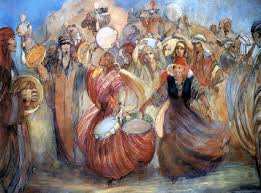Esau Married the Daughter of Ishmael,
in Addition to the Wives He Already Had
28: 6-9
Esau married the daughter of Ishmael, in addition to the wives he already had DIG: Upon hearing of his father’s preferences for a suitable mate, what does Esau do here? Do two wrong wives make a third one right? What does the Bible continue to point out about Esav and his decisions? What does this tell us about the relationship between Ishmael and Isaac?
REFLECT: Do you renounce sin in your life when you find it? Or do you pacify it with symbolic gestures? How can you restore a relationship with a family member that was once strained?
Esau now makes another attempt to regain the blessing. Now Esav learned that Isaac had blessed Jacob and had sent him to Padan Aram to take a wife from there, and that when he blessed him he commanded him not to marry a Canaanite woman, and that Jacob had obeyed his father and mother and had gone to Padan Aram (28:6-7).

Esau then realized how displeasing the Canaanite women were to his father Isaac (28:8). He consequently thought that by not marrying another Canaanite woman, he would win back his father’s favor and possibly the blessing. So he went to Ishmael, the son of Abraham, and married his daughter Mahalath, the sister of Nebaioth, in addition to the wives he already had (28:9). This is the classic case of closing the barn door after the horse is gone. Although Esau did not marry any more women of Canaan, he was not willing to send away those he already had, in spite of their unsuitability and wickedness. Basically, he married his cousin because he thought it would please his father Isaac. She was a descendant of Avraham through Ishmael. But this just magnifies Esau’s lack of spiritual perception. The Ishmaelites were just as rejected as the Canaanites or the Philistines. Ironically, the rejected son of Isaac married into the rejected line of Ishmael. At any rate, he failed to impress his parents and the marriage goes unnoticed by his father and mother.
But however clueless Esau might have been about his birthright, it is interesting to note what this says to us about the relationship between Ishmael and Isaac. Marriages at that time only took place with the consent of both fathers. If the father was incapable or dead, the oldest son took his place. Ishmael had died at least fifteen years before Esau approached his family. Had Ishmael’s son Nebaioth been resentful about the fact that Isaac was the full heir, even though his father had been the firstborn, then he would not have given his sister to Esau. Instead, he trusted her completely to his cousin. It seems that Ishmael had experienced healing through the blessing of his twelve sons (to see link click Gi – The Twelve Sons of Ishmael).
All this only furnished further proof that Esav had absolutely no understanding of the blessing and what it meant. Once again, he was proven unfit to receive it. He tried to act godly in the futile hope that somehow or other it would be pleasing to ADONAI. There are many like that today. They will not do exactly what God requires, but something like it. They will not give up the world entirely and put the LORD first in their life, but merely rearrange the deck furniture on the Titanic! They will not renounce sin, but pacify it with symbolic gestures.
While Esau was occupied with the “honey-do’s” of his three wives, Jacob was off to Paddan Aram in search of a bride.
Haftarah Tol’dot: Mal’akhi (Malachi) 1:1-2:7
(see my commentary on Deuteronomy, to see link click Af – Parashah)
Priests were charged with the calling to honor the name of ADONAI (Malachi 2:1-2). But Malachi tells us that they turned away from the path, caused many to fail in the Torah, and corrupted the covenant of Levi (Malachi 1:8), offering blemished sacrifices (Malachi 1:13; Leviticus 22:18-20). YHVH was so repulsed by this that He cursed the priestly privilege of bestowing the blessings of life and peace to the people (Malachi 2:2). The curse would affect the seed of the coming generations of Levi (Malachi 2:3). In fact, the covenant with Levi may not pass from this generation. High standards are required of priests (Malachi 2:4). Godly priests walk in awe of ADONAI-Tzva’ot (Malachi 2:5-6). They were supposed to be teachers and guardians of moral life, warning the people to live uprightly as messengers of righteousness (Malach 2:7). Omitted from the Haftarah reading are the next two verses, which judge that generation and threaten to halt the passing of the covenant to the sons of Levi (Malachi 2:8-9).
B’rit Chadashah suggested readings for Parashah Tol’dot:
Romans 9:6-16; Messianic Jews (Hebrews) 11:20 and 12:14-17
Again, ADONAI uses a man’s name for his descendants. Tol’dot describes generations that follow. In the Toarh, Isaac’s generations are Jacob (who will live through his sons). In the Haftarah, Levi’s covenant describes the priests to come. Here Rabbi Sha’ul reviews that his countrymen according to the flesh, gave birth to Messiah according to the flesh (Romans 9:3 and 5). Not all of Abraham’s descendants, however, will inherit the seed of promise (Romans 9:7-8). Rather, Jacob is chosen – not on the basis of works (for he had not yet done good or evil), but solely on the basis of calling (Romans 9:11). God’s choice was made while the twins were in the womb! God called Jacob prior to his being born. The principle that the older shall serve the younger (Romans 9:12) sets the stage for YHVH’s plan of redemption. Isaac will pass on his birthright to Isra’el (Jacob), father of a nation. The Jewish people are the beneficiaries of this everlasting inheritance.



Leave A Comment